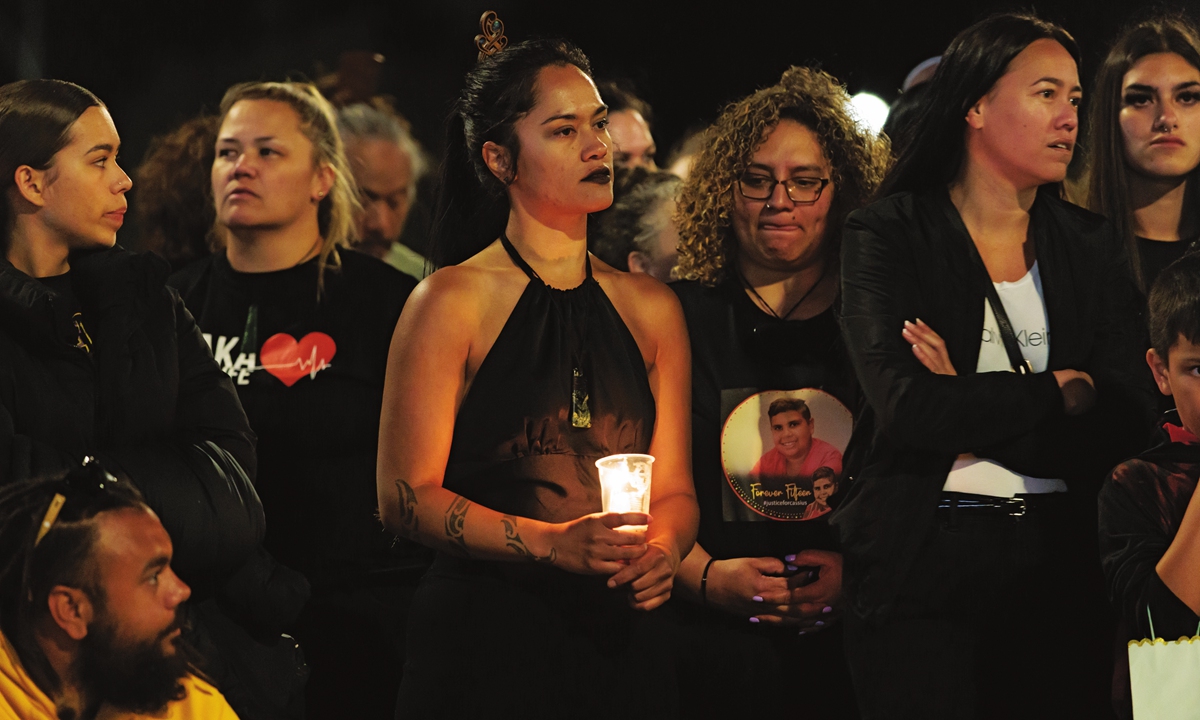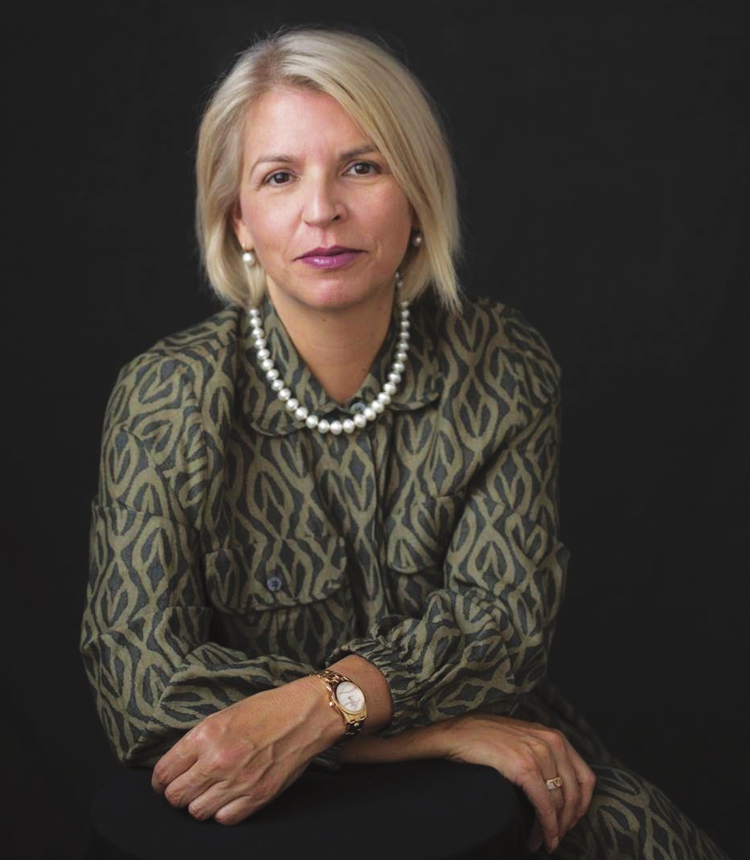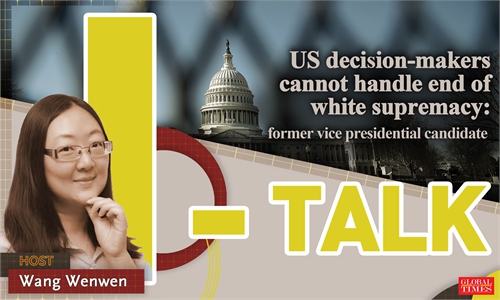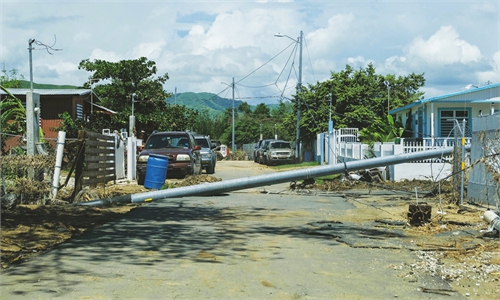
Family, friends and members of the public gather during a vigil for Cassius Turvey, a 15-year-old Indigenous boy who was allegedly bashed with a metal pole while walking home from school and later died, at Midland Oval in Perth, Australia, October 31, 2022. Photo: IC
Editor's Note:
The recent killing of 15-year-old indigenous boy Cassius Turvey in West Australia has evoked memories of the mistreatment and discrimination against indigenous people across Australian history. So far, the Australian government has failed to truly address this hundreds-year-old problem. Statistics show that in some parts of the country indigenous people are six times more likely to be assaulted than non-Indigenous people. Their rights are not respected, and racism exists with disastrous effects on society and on Australia's international reputation. In her I-Talk show, Global Times (GT) reporter Wang Wenwen talked to Hannah McGlade (McGlade), a Noongar human rights lawyer, academic from Western Australia, about the human rights quandaries Aboriginals in Australia face.
GT: The most recent incident that raised the concern of international public opinion was the death of 15-year-old Cassius Turvey. Even Australian Prime Minister Anthony Albanese said it was "clearly racially motivated." There have been many murders against Aboriginal people and the perpetrators have not been punished. Why is racial violence against Aboriginal people unresolved for so long in Australia?
McGlade: I think because we had such a racist colonial past and the way that Australia was colonized was quite unlawful and brutal. Typically around the world, there were treaties made with indigenous peoples. That didn't happen here [in Australia] and aboriginal people were really treated not as humans, [but] as people to be violently dispossessed and to be exploited for labor in a way that was similar to slavery.
So we have this very long, violent, racist and brutal history that hasn't been tackled yet in Australia. Racism has bubbled away - racist violence, and even killing of aboriginal children and youth has happened. Perpetrators haven't been held to account. We're not actually implementing our fundamental human rights commitments to end racism. Although we've signed the treaty, it's not happening in practice, and non-indigenous people are still acting in a very oppressive way, including through institutions, including through the legal bodies that are established to address racism.
So we will be engaging in some very important national dialogue about these issues and hopefully making progress. We need to campaign and I'm doing that now for proper laws to prohibit and punish perpetrators of racist violence. We haven't done that in my state.
GT: There has been a systematic cleansing of Aboriginal culture throughout the history of both the US and Canada. Does similar cleansing exist in Australia?
McGlade: We certainly have had a history officially recognized as genocidal. That's a very serious finding against a country, but it was justified on the basis of the evidence, particularly in relation to the systematic removal of aboriginal children from their families and their communities. The purpose of those policies and laws which took place for over 100 years was really to end the aboriginal people as a race of people. So it certainly was the form of genocide. Although the assimilation policy has been rejected since the 1970s, many aboriginal people experience systemic and structural discrimination, racism and also some kind of expectation very often that they be just like white Australians, which is very wrong in this day and age.
GT: You were involved in opposing the destruction of the Juukan Gorge shrine in 2020. What are the dilemmas facing the protection of Aboriginal lands and cultures in Australia?
McGlade: The main issue is Aboriginal people's human rights to protect culture, which is very closely linked to land and sacred sites. The spirituality and culture is embedded in our land and our mother earth in the dream time. The laws and legislation in Australia do not give aboriginal people the right to actually say no when a site is so important and significant that it really mustn't be destroyed for mining or development. In West Australia, it's believed that well over 1,000 Aboriginal sacred sites or heritage sites have been destroyed against the wishes of aboriginal custodians from those lands. And indigenous people say we won't be able to keep our culture alive and to have the relationship with this country as indigenous people when we don't have any of our sacred important lands left.
We have gone to the UN to complain about or communicate about the Western Australia Heritage Act to try to improve the situation so that there can be a more balanced approach to mining development and indigenous rights and indigenous people's right to cultural survival.
GT: As an Aboriginal, have you personally experienced any unfair treatment?
McGlade: Yes, I have. It begins when you're a child in school and you are called names. Nowadays, these racist names may not be as common, but it's the exclusion and bullying that Aboriginal children experienced. As you get older, it's more like attitudinal issues. For very dark-skinned people, it can be another experience of actually being watched in shops and followed around as if they're thieves. That's a very common one. Once I experienced being abused by police. I experienced that when I was taking part in a demonstration to protect an Aboriginal significant site linked to the Wagyll rainbow serpent, who's the creator spirit for our country here. But police can be very rough in their interactions with Aboriginal people. And we've had people actually die in custody sadly.
I'm also a descendant of early Chinese. My surname is from Ireland, but my great grandfather was not allowed to be married to my grandmother, because this was prohibited for a non-indigenous white man to be married to an indigenous woman. So they had to live away in high secrecy. The father of my great grandmother was an indentured laborer from China. There were Chinese people who came here, who were indentured and who also experienced very harsh treatment as well.

Hannah McGlade. Photo: Courtesy of McGlade
GT: You are a human rights lawyer and academic who has been advocating justice for indigenous peoples for many years. Can you share one of the cases you have been involved in?McGlade: My first case as a new law graduate was against a Liberal federal senator in parliament, Senator Ross Lightfoot, who opposed the introduction of Aboriginal studies in Western Australia primary schools. He used very racist and derogatory language publicly in parliament, but also outside to a journalist. These comments were broadcast widely in the media.
I was really shocked because I thought that was how it was when I was a girl in school. But this kind of really overt and ugly racism against our culture is still out there. And in fact, it's a senator who's making these statements. I really believe that children should have a good, multicultural education and should know about the indigenous cultures.
So I started a complaint under the new race vilification laws. There were federal laws introduced in the race discrimination act. They were reflecting our UN commitments to the International Convention on the Elimination of All Forms of Racial Discrimination. It actually took me five years before that case was finalized.
I was successful in proving racial vilification against the senator. There were some trials though, because the human rights body actually threw the case out or dismissed it at one point saying it lacks substance or merit. It certainly did not and that decision shocked people. And I had an excellent lawyer represent me in that case. We set aside the decision of the human rights commission, and we had it heard in the federal court. It was finally upheld after five years. It was the first successful prosecution by an Aboriginal person under these new laws.
GT: Statistics show that the prison rate of Aboriginal people is more than 10 times that of non-Aboriginal people. Nearly 500 Aboriginal people have died in custody over the past 30 years. How do you feel about this data? What is the human rights situation faced by indigenous Australians?
McGlade: This is a really shocking issue that indigenous people, including children from the age of 10 years old, can be incarcerated and are being incarcerated. We even have children now in an adult maximum-security men's prison in Perth. That is a very wrong thing. It's absolutely inhumane. It is a human rights violation to put children in adult prisons, because the message that you are sending to those children is that they don't deserve any better in life, plus you're putting them at risk of adult offenders or perpetrators.
Now, there has been a situation of racial profiling and systemic racism and discrimination against Aboriginal people throughout the decades and from the point of colonization.
The first public building in the city I lived in Western Australia was a very unique architectural building that was a prison for indigenous people who resisted the indentured labor system that was being imposed. It was akin to slavery, even our children were subjected to it.
The deaths that are happening in custody are a national shame. We've had a royal commission into aboriginal deaths in custody over 25 years ago. And we have key recommendations from that inquiry that haven't been implemented to this day. In particular, that incarceration should only be a matter of last resort. Our legal services are aware of children and young people who have stolen food because they're hungry and have been incarcerated for such crimes. We haven't had a reparations process in Australia. There was unlawful dispossession, and many Aboriginal people are still living in poverty. And crime rates do reflect that as well as the racial profiling and the discrimination. These are issues that we must address and have much more attention to. It is really the most serious human rights issues in this country - the violence to women, the removal of children, and the incarceration of Aboriginal people, including women and children.
GT: While the Australian government often accuses other countries of human rights violations, do you think such accusations are convincing?
McGlade: The Australian government does have a duty to acknowledge human rights issues, but I think they have a duty equally to increase the recognition and responses to these very serious human rights issues that are happening in Australia. What we see is Australia taking part in United Nations processes at one stage where it was considered to be a leader. When we signed the universal declaration on human rights, at the same time, indigenous people were considered legally as second-class citizens and children were able to be are removed at a whim for assimilation purposes.
So certainly Australia needs to increase respect for human rights and not just verbally, but ensuring that there's investment into the realization of those rights, particularly indigenous people. There certainly is, unfortunately, a level of hypocrisy in failing to do that properly to date. At this point, we haven't signed the [UN] Optional Protocol to the Convention on the Rights of the Child. That's very worrying when actually aboriginal children are being incarcerated at such high rates. An aboriginal child in my state is actually 15 times more likely to be incarcerated than a non-indigenous child. They're very young, they're not fully developed. The medical professionals realize how dangerous this is to children and they oppose it. But our governments are dragging their feet. They don't care because it's not their children, and that's simply not good enough.
GT: Some scholars believe that colonialism played an important role in the injustices suffered by indigenous peoples. What do you think of the impact of colonialism on Australian society? How can this systemic problem be solved?
McGlade: The colonial history was so violent and abusive to indigenous people. Australia was colonized on the basis that it was a Terra nullius country, an empty land, or a land belonging to no people. And we haven't made the proper effort yet to overcome that history of dispossession and violence to indigenous people. We've had important processes such as a reconciliation process that went on for 10 years and recommended that we enact treaties with indigenous people and that we amend our constitution to prohibit race discrimination. We're at another juncture now where our new federal government has promised to reform the constitution, to ensure that indigenous people now have a voice to parliament protected in the constitution. We also negotiate treaties finally with indigenous people, and that we have a process of truth telling and a Makarrata Commission.
So it is now somewhat exciting times, but the challenges are still so huge because of these serious human rights issues and violations that we've been talking about.
GT: Has the Australian government provided enough assistance? How can the Australian government tackle the problems indigenous people face?
McGlade: I have, along with many indigenous people across the country, an expectation that we must see better from our governments. Particularly our federal government, we feel, has more integrity to indigenous people generally. In West Australia where I live, we don't see the commitment from my government at all and aboriginal people feel that it's a very outdated, paternalistic, dismissive attitude to indigenous people, which is very much inconsistent with the UN Declaration on the Rights of Indigenous Peoples that Australia has endorsed for over 10 years now.
We will continue to be strong advocates for human rights and call on Australia to implement the Declaration on the Rights of Indigenous Peoples, including through a national action plan, to uphold our human rights obligations and the advice of the UN treaty bodies, and to increase our commitment where we need to in law, including through, for example, the Optional Protocol to the Convention on the Rights of the Child.
We've recently had a UN body come to investigate prisons and detention centers. Some states did not allow them into the detention centers, and they suspended their visa to Australia. This was very sad, a very poor reflection on our country. The governments today have not actually properly influenced the states with their respective requirements to understand those requirements and to give respect. We really should be treating with the human rights commitments seriously.



